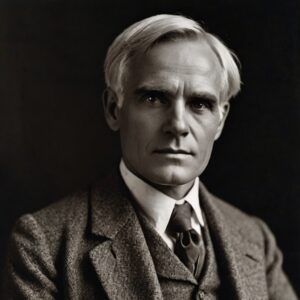At Perspectives Forge, we are dedicated to exploring the ideas that have reshaped society and asking, “How can these legacies inspire us to forge a better future?” In the world of education, one figure stands out as a pioneer of universal access to schooling—Horace Mann. Often called the “Father of American Public Education,” Mann’s vision for a free, non-sectarian, and publicly funded education system transformed the landscape of learning in the United States. Let’s examine how this visionary leader forged a new perspective on education that would influence generations to come.

A New Vision for Education
Born in 1796 in Franklin, Massachusetts, Horace Mann grew up in a time when education was a privilege reserved for the wealthy. The idea that all children, regardless of their social or economic background, should have access to quality education was virtually unheard of. But Mann was driven by the belief that education was the key to both individual empowerment and the progress of a democratic society.
As the Secretary of the Massachusetts Board of Education, Mann embarked on a mission to create a universal public education system that would be available to all children. He traveled across Europe, drawing inspiration from Prussian educational models, and came back determined to reform the fragmented and often inadequate schooling system in America.
Mann’s contributions to education didn’t just focus on expanding access—he sought to change the very nature of schooling itself. He believed that education should develop the whole person, not just impart basic literacy and arithmetic skills. His vision for a publicly funded, non-sectarian, and standardized education system laid the foundation for modern public schooling in the United States.
Mann’s Contribution to Education
Horace Mann’s revolutionary ideas about education were built on several key principles, each of which continues to shape the structure and values of public schooling today:
Universal Access to Education: Mann was a fierce advocate for the idea that education should be available to all children, not just the privileged few. He believed that a democratic society could only thrive if all citizens were well-educated, making public education essential for the common good. His fight for universal education opened the doors of learning to millions of children across the U.S., regardless of their socioeconomic background.
Publicly Funded Schools: Before Mann’s reforms, education was often privately funded or operated by religious groups. Mann championed the idea that education should be funded by the government and free for all students. This marked a profound shift in the way schooling was viewed, making it a public responsibility rather than a private luxury. His work laid the foundation for the system of tax-supported public schools that exists today.
Non-Sectarian Curriculum: One of Mann’s key principles was that public education should be non-sectarian, meaning that it should not promote any particular religious or political ideology. He argued that schools should focus on teaching a common curriculum that would promote civic responsibility and moral values, without being influenced by religious divisions. This principle became central to the development of secular public education in the United States.
Teacher Training and Professionalism: Mann believed that the quality of education depended heavily on the quality of teachers. He advocated for the creation of teacher training institutes, or “normal schools,” where prospective teachers could learn the skills needed to effectively educate children. This focus on professional development for teachers helped to raise the standards of teaching and ensure that children received a well-rounded education.
Moral and Civic Education: While Mann promoted a non-sectarian approach to schooling, he also believed strongly in the importance of moral education. He felt that schools should not only teach academic subjects but also instill moral values such as honesty, respect, and integrity. In his view, education was a tool to shape responsible citizens who could contribute positively to society.
The Impact of Mann’s Reforms
Horace Mann’s reforms had a transformative impact on the American education system. By the time of his death in 1859, his advocacy had helped to establish free public schools across much of the United States. His belief in the power of education to uplift individuals and improve society influenced generations of educators, policymakers, and leaders. The establishment of publicly funded schools meant that education was no longer the exclusive domain of the wealthy, but a fundamental right for all.
His focus on teacher training also had a lasting impact. By raising the standards of teaching, Mann ensured that the quality of education in public schools improved, which in turn increased opportunities for students from all walks of life. His emphasis on moral education and the development of civic virtues continues to shape public education systems, promoting the idea that schools play a critical role in forming responsible and engaged citizens.
The ripple effects of Mann’s reforms have been felt far beyond the borders of the United States. His ideas influenced education systems in other democratic nations and helped to popularize the notion of public education as a means of promoting equality and social progress.
A Legacy That Continues to Influence
Horace Mann’s contributions to education were nothing short of revolutionary. His vision of universal, free, and publicly funded education created a path toward greater social equality and opportunity. Mann saw education as the great equalizer—a tool that could lift people out of poverty, promote civic engagement, and create a more just society. His work continues to resonate with educators, reformers, and policymakers around the world.
Today, the principles Mann advocated for are widely accepted as the foundation of modern public education. The idea that every child has the right to a quality education, regardless of their background, is a direct result of the groundwork laid by Mann. His belief in the transformative power of education still shapes our world, reminding us that the foundation of a thriving society begins with a well-educated populace.
Forging Education for All
Horace Mann’s vision for public education challenged the status quo and reshaped society’s view of learning. At Perspectives Forge, we believe that his work offers a timeless lesson in how education can be a tool for both individual and societal transformation. Mann forged a perspective on education that was rooted in equality, opportunity, and moral development—ideas that remain as important today as they were in the 19th century.
As we continue to confront challenges in our education systems, Mann’s legacy reminds us that education should be more than just academic achievement—it should be a path to moral growth, social responsibility, and personal empowerment. In a world still striving for greater equality, Mann’s revolutionary ideas about education continue to offer a powerful blueprint for building a better future.
